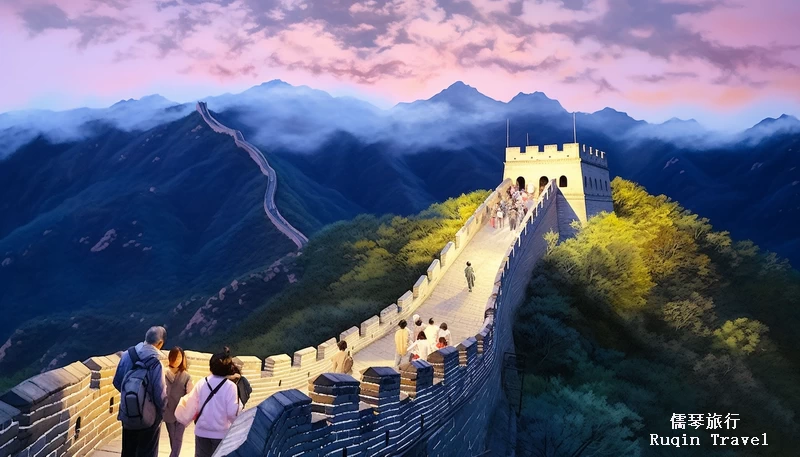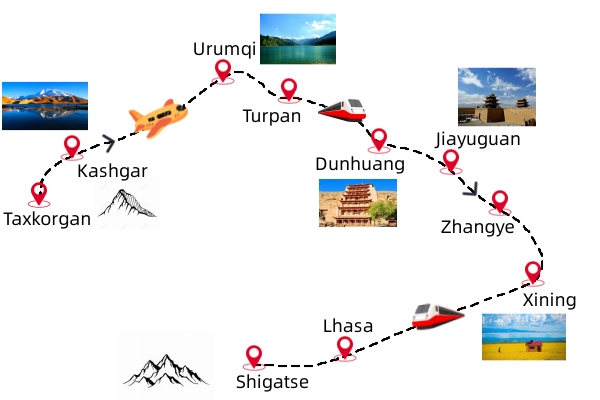20 New Facts To The Flavors of Chinese Cuisine
20 New Facts To The Flavors of Chinese Cuisine
Blog Article
Top 10 Tips To Shop At Street Markets In China
1. Arrive EarlyTip: Visit markets early in the morning, when vendors are setting up and may provide better bargains for their first sale.
Pro: Shopping earlier gives you an increased selection of goods and better bargaining opportunities.
Cons: It requires you to wake up early. Not everyone has the time.
2. Bring Cash
However, mobile payment options, such as WeChat Pay Alipay and Alipay, are increasing in popularity.
Cash payments can facilitate transactions and give you an advantage in negotiations.
Con: Carrying cash may increase the risk of loss and theft.
3. Learn Basic Mandarin
You can use phrases such as "Zhege duoshao Qian?" to ask how the cost of something is. Knowing phrases like "Pianyi duoshao ban" (Can I reduce the cost?) or 'Zhege doshao qian?' can help to communicate effectively. Effective communication is important.
Pro: Develops rapport with local vendors, and displays respect for their customs.
Cons: The lack of vocabulary can cause confusion.
4. Inspection of Goods
Check for any defects or flaws, particularly in clothing, electronics and crafts.
Pro: Ensures you get what you're paying for and avoids disappointment later.
Pro: It is a time-consuming process and may make vendors angry.
5. Buy Confidently
In most street markets it's not uncommon to haggle. First, you should try to lower the price by 50%-70%.
Pro: Bargaining can be a great way to reduce expenses.
Cons: It's difficult for those unfamiliar with the process.
6. Beware of fakes
Beware of fakes when purchasing items that are branded, such as watches, electronic devices and bags.
Pro: Avoids wasting money on imitations of poor quality.
Contra: Real goods are harder to come by and cost more.
7. Local Customs
Tips: Learn from locals how they shop or negotiate and how they interact with vendors to adjust your style.
Pro: Helps you blend in and avoid making cultural missteps.
Con: It may take some time to master the habits.
8. Keep Valuables Secure
Tip - Use anti theft bags or secure your wallets and phones inside pockets in order to avoid being picked up at markets.
Reduces the risk of theft in high-traffic areas.
Pro: Extra security measures may seem restrictive or uncomfortable.
9. Try Before You Buy (Food)
Make use of the fact that many food retailers will let customers to taste snacks and dried products before buying the items.
Pro: Make sure you're satisfied with the taste and freshness of the food.
Cons: Some vendors will pressure you into buying by offering a free trial.
10. Know the market's main focus
Tip: Each market specializes in certain items--like Shanghai's Yuyuan Market for souvenirs or Beijing's Panjiayuan for antiques. It is possible to research your needs and match them to the market you're visiting.
Pro: Reduces time and helps you focus.
Cons: It restricts spontaneity to the extent you must adhere to the facts you have researched.
The Benefits of Shopping Street Markets
Unique Finds - You can discover items in shops that aren't found elsewhere including local food items and hand-crafted craft items.
Street markets are usually less expensive than shopping malls and other stores.
Cultural Experience: Interacting with vendors and walking through the markets is a great opportunity to get immersed in the local culture.
Large Variety One market could have everything from gifts to food items and clothing.
The cons of shopping at markets on the streets
The likelihood of finding copyright goods is a high likelihood of finding fake or inferior products.
The crowds can be overwhelming particularly during weekends or on holiday weekends.
Pressure from Vendors: Certain vendors may use pushy sales tactics, making the experience a bit overwhelming.
There are no returns: Most purchases are considered final and there is no recourse for refunds or exchanges.
If you're prepared and follow these tips and you are prepared, you'll be able to make the most of China's vibrant market streets. See the top discover this famous landmark for blog examples including eating in lanzhou, zechawa valley tour route, ganden temple, kashgar tour maps, eating in zhengzhou, blue dragon temple, shopping in shangri la, chinaexpeditiontours.comattractions, anren ancient town, entertainment in beijing and more.
Top 10 Tips For Visiting The Temples Of Fame During Seasonal Visits In China
1. Visit during the off-season Tips for Autumn/Winter are planning to visit famous temples in the off-season (autumn/winter) which usually falls between November and February, consider visiting them. This is when fewer tourists are present, and the weather is cooler.
Pro The experience is more busy and more quiet.
Con: The weather may be chilly than usual, which could make outdoor temple tours less enjoyable.
2. Be prepared for extreme weather
Tips - Temperatures can vary dramatically in different seasons. Winters can be extremely cold, and summer temperatures can be extremely hot. Be prepared.
Pro tip: Prepare yourself for any weather conditions, and enjoy your journey in comfort.
Con: Packing to accommodate the extremes of seasons can be a hassle If you're traveling in a small amount.
3. Visits in the Spring and summer to see Vibrant Flora
Tips: Going to temples during the summer and spring months is a great way to view beautiful gardens, blooming flowers and lush landscapes surrounding the temples.
Beautiful scenery enhances the experience of visiting the temple grounds.
Con Cons: Summers in the United States can be very hot and overcrowded. This is especially the case on National holidays.
4. Consider Festivals & Special Events
TIP: Plan your trip during traditional celebrations, such as the Chinese New Year in January/February or the Mid-Autumn Festival in September. It is the ideal time to visit a temple since it has specific rituals and ceremonies.
Pro: The temples often have lively traditional celebrations and provide a unforgettable, unique experiences.
Con: During festivals temples may become very crowded and prices for accommodation could increase.
5. Avoid Peak Holiday Seasons
Avoid visiting during the peak tourist seasons (e.g. Chinese New Year or Golden Week in October), when temples are overcrowded both with international and local tourists.
Pro: Peaceful visits, with no crowds. Provides an uplifting experience.
Cons: Certain special events may be not attended to during busy times.
6. Be sure to check for winter Temple closures.
Tips: Some temples might have limited hours or closed during winter's colder months, in particular in remote regions or northern regions. Check before you travel.
It helps you avoid unnecessary trips, and lets you plan other things to do.
Con: Many temples are either closed or reduced in hours due to renovations. This can lead to disappointment.
7. Early Morning Visits to the Beach in the summertime
Arrive in the early morning when you plan to visit during summer to avoid the heat of midday. The majority of temples be open from dawn. This is a peaceful time with less visitors.
Cons Pros: The crowds aren't as loud, and the temperature is cooler.
Con: Might not be suitable for all.
8. Get ready for the season of rain
In southern China there are heavy rains that can be expected during summer months. If you're planning to visit during this time, pack an umbrella or rain gear to stay comfortable.
Pros: You will be able to take pleasure in the beauty of temples even in the event of rain.
Cons: Rain can cause outdoor activities to be disrupted as well as temple grounds to get slippery.
9. Visit Mountain Temples during Autumn
Tip: The autumnal foliage is a beautiful backdrop for temples in areas of mountainous terrain (e.g. Mount Wutai and Mount Emei), as it's the time of year when the weather is pleasant.
Pros: The cool temperatures allow for more comfort when walking or hiking and also allow for breathtaking views.
Con: Popular mountain temples have a tendency to draw crowds especially on weekends or holiday seasons.
10. Use the Lunar Calendar to Plan Specific Events
Tips - A lot of temples in China make use of the lunar calendar. Certain ceremonies and events are also tied to certain lunar dates. To be able to attend events such as Buddha's Birthday or the Lantern Festival in China, you should check out the lunar calendar.
Pros: Greater understanding of spiritual practices and unforgettable cultural experiences.
Con: It can take extra time to study and plan on the lunar calendar and some events might not be aligned with your travel dates.
The benefits of seasonal visits to Chinese Temples
Less crowds during off-season visits offer a more peaceful and contemplative experience.
Cultural Festivals: These events can provide a deeper understanding of local religions and cultures.
Scenic Beauty - Spring and autumn are great time to go. It is possible to enjoy stunning landscapes as well as vibrant gardens at temples.
Take advantage of the cooler temperatures of autumn and winter to explore temples.
Pros and Cons of Visiting Chinese Temples during the Season
Unpredictable weather: Winter can be extremely cold and the summer is too hot. This could impact your ease of living.
Temple Closures: Certain temples may have restricted hours or be closed during the off-season or in extreme weather.
People are crowded during festivals Holidays and festivals are often accompanied by large crowds, making it difficult to experience the temple's peaceful atmosphere.
Limited Activities: If you are visiting outside the time of the year, certain seasonal events might not be scheduled.
It is possible to make your visit to the temples of China more enjoyable and meaningful by choosing the best season and planning ahead. Understanding the changing seasons at the temples will enable you to maximize your trip, regardless of whether you're seeking peace or a cultural festival. Take a look at the recommended read more about this incredible site for site examples including entertainment in beijing, shanghai portman acrobatic show one of the best acrobatic shows in shanghai, hua diao the most famous shaoxing yellow wine, mount li a royal garden since the zhou dynasty, chinese furniture the development history of chinese furniture, shopping in tibet, shopping in macau, blue dragon temple, chinese festival cuisine, some gifts from china and more.